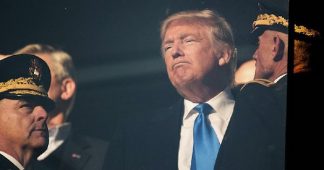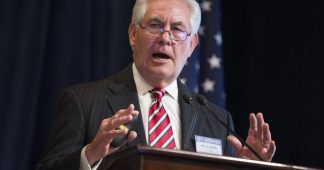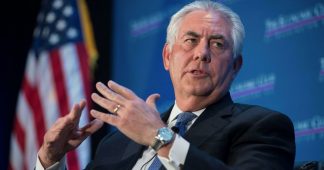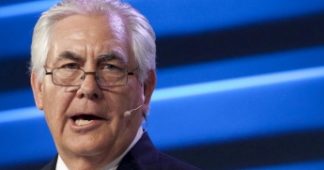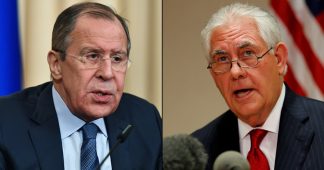Mr. Tillerson, Donald Trump’s Secretary of State, is going now to Moscow. On the eve of the trip, he begun by addressing various sorts of hostile and threatening declarations to the Russians. One wonders if this guy knows anything about History and if he understands really what is the power he wants to deal with. The article below, which we reproduce from Counterpunch, provides us with an excellent description of how Mr. Tillerson handled Climatic Change, the second most important danger to life after a nuclear war, the game he seems eager to play with now. With such people running the foreign policy of one of the two nuclear superpowers, it is just becoming very difficult to hope for the better.
Roaming Charges: Exxon’s End Game Theory
by Jeffrey St. Clair
If there ever was the sound of a doomsday clock chiming midnight, the signal moment probably occurred last fall, though the alarm went almost unnoticed by the press. In October, major observatories across the world simultaneously recorded that atmospheric carbon levels globally breached what has long been considered the “redline” of 400 parts per million and are likely to keep rising inexorably for the foreseeable future. The 400 parts per million mark has long been considered, even by climate optimists, a fatal tipping point, beyond which there is little hope of return.
One person who probably did take note, however, was Exxon’s CEO Rex Tillerson. I don’t know if Tillerson cracked an evil grin at the time, but I’m sure he must have felt that this grim milestone validated his strategic thinking for the past ten years as mastermind of the world’s largest oil conglomerate.
Despite what you may have heard from the Sierra Club, Rex Tillerson is not a climate change denier. He is something far more dangerous. Tillerson knows climate change is taking place. He was in position to possibly do something about it, evaluated his options and coolly chose not to change course.
Rex Tillerson took over Exxon in 2006, at a fraught time for the oil giant. Its longtime CEO, Lee Raymond, had just stepped down, handing the keys to the kingdom to his protégé, a star player on what the company called the “upstream” team, scouting and securing new oil fields to plunder. During his 12-year term as head of Exxon, Raymond ran the company with a dictatorial and dogmatic hand. He was hostile towards environmentalists and unflinching in his dismissal of climate science. Raymond sluiced tens of millions in company money into anti-environmental front groups, pro-oil politicians and industry-friendly scientists. But by 2005, there was a mini-rebellion brewing inside Exxon’s corporate headquarters in Irving, Texas. Like the French Revolution, this revolt was led by lawyers. (See Steve Coll’s definitive Private Empire: ExxonMobil and American Power.)
The company’s attorneys feared that through Raymond’s belligerence Exxon was making itself vulnerable to a legal attack for covering up and distorting the threats posed by climate change. The concern here wasn’t from lawsuits by outside groups, such as Greenpeace, but from the company’s own shareholders and investors who might claim that Exxon had concealed a looming financial risk to the company’s bottom line.
One of the big problems confronting Tillerson the day he took over the reins was the fact that the very scientists at MIT and Stanford who had been cashing Exxon’s checks for decades to churn out white papers questioning whether fossil fuel emissions were a driving force beyond climate change, had begun to change their tune. In fact, in 2003 MIT’s Global System Model, largely underwritten by Exxon, forecast a 2.4-degree-centigrade rise in global temperatures over the next hundred years. By 2006, those same scientists had more than doubled that estimate. Exxon faced the prospect of being betrayed by their own bought science.
Organizationally, Exxon changes course about as quickly and adroitly as its Valdez tanker did while trying to navigate Bligh Reef in Prince William Sound. But Tillerson is a pragmatist. A Texas boy, Tillerson idealized the Boy Scouts and when he became head of the Exxon behemoth he began handing out merit badges to company executives who met their production quotas. He set to work with an Eagle Scout’s pious determination to quietly recalibrate the company’s position on climate change. It was, in Tillerson’s mind, a concession to reality.
During the early days of the Iraq War, Exxon set up a special team to run war games on how the invasion would affect the oil industry in terms of pricing, supply and distribution networks. It sent the results of these scenarios to Dick Cheney through Cheney’s factotum Douglas Feith, and so war planning and oil development proceeded in harmony. Tillerson was familiar with the Iraq war gaming and decided to use a similar technique to help chart the company’s new climate change strategy.
Tillerson wanted his secret squad of climate change gamers to answer four questions: 1. Is climate change real? 2. Is the threat serious? 3. Are there any effective actions that can be taken to halt or reverse climate change or mitigate the damage? 4. Are the world’s leading carbon emitters likely to impose binding limits on emissions in time to prevent runaway climate change? The answer to the first two questions was “yes”. The answer to the third question was “maybe” and the fourth “no”.
The lesson Tillerson took from this assessment was that climate change is a serious threat and no government has the will or perhaps even the means to confront it. Thus, the only responsible thing to do for the shareholders of Exxon was to push forward aggressively with exploration and development of new oil fields and ventures, from Amazonia to Russia, before some other company captured the reserves. Internally, this became known as the “end game” scenario.
As CEO of Trump’s foreign policy enterprise, Tillerson seems likely to impose this cynical template on the world at large by forging new alliances with old rivals in kind of a Pax petroliana, where the body count of hot wars will be replaced by the hidden, slow deaths caused by an atmosphere gone lethal.
